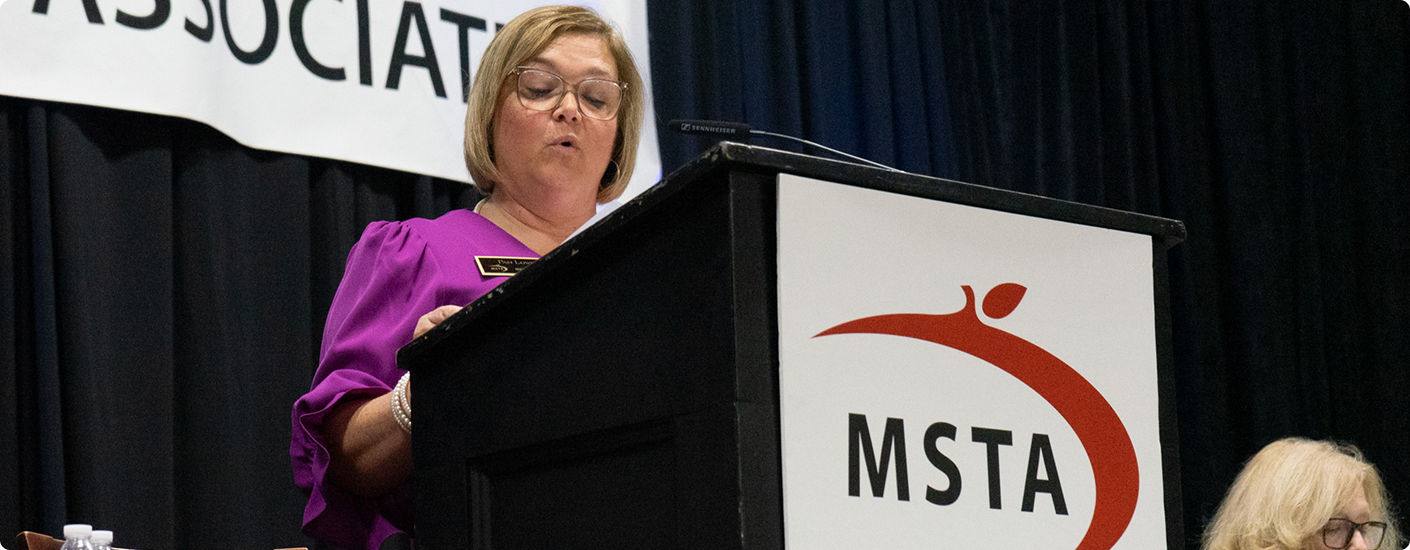2025 Convention Workshop Descriptions
Learn about the breakout sessions that will be available at the 2025 MSTA Convention.
Thursday, November 20, 2025 — 3:30–4:30 PM (8 sessions)
Books Students Will Love: Recommendations from the Reading Circle
Grade Level: K–12
Strands: Engagement of Learners, Standards-Based Teaching and Learning
Looking for fresh titles to spark your students’ love of reading? The MSTA Reading Circle Committee will share their favorite new books for every age group, from picture books to Young Adults. You’ll also learn how to use TeachingBooks.com to discover lesson ideas, author insights, and other tools to enrich your teaching.
Kara Potter, Lysha Thompson, Jenn Baldwin, Kayla Gilmore; MSTA Reading Circle Committee
Champion Teaching Techniques for Champion Students = Greater Outcomes and Stronger Classroom Communities of Learners
Grade Level: K–8
Strands: Behavior Management, Brain-Based Teaching & Learning, Engagement of Learners
Are you a champion teacher looking for techniques to be a champion for your students? Are you seeking greater engagement outcomes in your classroom community of learners? Are you feeling the pressure to increase test scores? If so, this session is for you!
Attendees will learn how to implement Teach Like a Champion and Whole Brain Teaching Techniques. The presentation will consist of hands-on learning opportunities to support classroom management and engagement strategies. These concepts are oldies, but goodies that are game changers for your classroom and can be tools added to your “tool belt” the very next day! Attendees will walk away with a variety of resources such as websites, video links, and firsthand experiences. You will learn how the presenter, a first-year principal, serves as the lead learner within an elementary building. The outcome of these techniques will allow you to build confidence in yourself and students alike. The classroom community of learners will have a greater impact when attendees implement the techniques.
Tyler Lappe; Neelyville School District
Introduction to Whole Brain Teaching Basics: Unlocking Student Engagement
Grade Level: K–12
Strands: Behavior Management, Brain-Based Teaching & Learning, Engagement of Learners, Social Emotional Learning, Trauma-Informed Teaching
In this presentation, Whole Brain Teaching practices will be introduced that help establish and maintain a safe and effective learning environment through student interaction, meeting the needs of students’ well-being, and minimizing disruptions. These engaging learning experiences promote student engagement and boost achievement while meeting the needs of diverse learners.
Laura Forehand; Rock Port School District
Proactive Strategies to Support Dysregulated Students
Grade Level: K–12
Strands: Behavior Management, Best Practices for Classroom Teachers Teaching Students with Special Needs, Multi-Tiered System of Supports, Social Emotional Learning, Trauma-Informed Teaching
Do you have learners who struggle with self-regulation? Do you spend more time managing the behaviors of dysregulated students than teaching? If you are ready to get on the proactive side of behavior and promote self-regulation in your students, this session is for you.
By implementing a multi-tiered support system that utilizes core components of trauma-informed practices and self-regulation programs such as “Zones of Regulation” and “Move, Work, Breathe,” one school was able to significantly recapture instructional time, increase test scores, and experience an 80% decrease in ISS/discipline referrals.
Participants will walk away equipped to design their own structured processes for providing breaks, teaching self-regulation and self-awareness, and enabling students to access tools and techniques that calm and control their bodies and emotions.
Sunnie Miller; Branson School District
PSRS – Providing a Strong, Stable, and Secure Retirement
Grade Level: K–12
Strand: Retirement
This educational session will provide an overview of the Public School Retirement system, how the system is funded, potential legislation changes, general retirement planning considerations and resources that are available to our members.
Amanda Wooten; Public School Retirement System
Repairing Executive Function
Grade Level: 6–12
Strands: Behavior Management, Brain-Based Teaching & Learning, Social Emotional Learning, Trauma-Informed Teaching
Executive functioning skills are a hot topic in education in this decade, as experts have determined these skills guide one through planning, organization, time management, working memory, and metacognition. Moreover, we also depend on other executive skills for response inhibition, emotional control, sustained attention, task initiation, flexibility, and goal-directed persistence. Many of these skills are underdeveloped and require the opportunity to be flexed and fine-tuned, not only for students, but also for teachers. This workshop will provide teachers with a basic understanding of executive function, an understanding of why it is important to nurture these skills, and a starting “road map” to implement activities to assist students in the healthy development of such skills.
Jennifer Kidwell; DeSoto School District
Using AI As a Resource Instead of a Restraint
Grade Level: K–12
Strand: Artificial Intelligence (AI)
Discover how to leverage the power of AI without compromising your teaching integrity. This session is designed for educators who are curious about AI tools but unsure how to integrate them ethically and effectively into daily instruction. As AI continutes to evolve, it offers exciting opportunities to spark creativity, challenge thinking, and streamline tasks like lesson planning, grading, and creating differentiated materials. However, it also raises important questions: Can AI maintain educational quality? How do we model responsible usage for students? Where do we draw the line between assistance and over-reliance?
Through engaging examples, practical demonstrations, and interactive challenges, this session will explore:
- Ethical considerations and best practices for AI in education.
- Practical classroom applications, from creating leveled texts to designing quizzes and rubrics.
- Tools like ChapGPT, Brisk, and Teachflows to save time and enhance personalized learning.
- Strategies for teaching students how to use AI as a springboard for authentic work rather than a shortcut.
Participants will leave with actionable ideas, free resources, and hands-on experience using AI tools to simplify planning, enhance feedback, and inspire creative learning. Whether you love AI or feel hesitant, this session offers a balanced, realistic approach to using AI as an educational ally.
Victoria Robertson; Webb City School District
Unlocking the Writer’s Toolbox: Mentor Texts in Action
Grade Level: K–5
Strands: Standards-Based Teaching and Learning; Differentiated Instruction; Brain-Based Teaching and Learning; Engagement of Learners; English/Language Arts
Strong writers are built through exposure to rich examples and intentional modeling. In this session, K–5 educators will learn how to use picture books and short mentor texts to teach authentic writing moves, spark creativity, and support early writers at all stages. We will look at practical strategies for selecting purposeful mentor texts across genres and using them to highlight accessible craft elements such as voice, structure, and word choice in ways that young learners can notice and name.
Attendees will walk through a process for guiding students to notice, name, and try out the techniques real authors use, shifting writing instruction from formulaic to inspired even in the primary grades. Through interactive analysis and planning, participants will design mini-lessons around craft moves and explore scaffolds such as shared writing, modeled think-alouds, and visual anchors that promote independence while honoring student voice. Whether you're new to mentor texts or refining your practice, you will leave with ready-to-use strategies, language for modeling author thinking, and ideas for building a classroom culture where students see themselves as writers learning from writers.
Dr. Nicole Portzen; Aurora School District
Thursday, November 20, 2025 — 4:45–5:45 PM (4 sessions)
Challenging Behaviors, Not Challenging Students: Practical Solutions for Teachers
Grade Level: K–12
Strands: Behavior Management; SEL; Trauma-Informed Teaching; Multi-Tiered System of Support
The presentation offered by Jennifer Moore, Project 180 Coordinator and the At-Risk District Lead at the Union R-XI School District, and Ursulla Wadley, formerly an At-Risk Coordinator and now the Southeast Regional Manager for JAG-Missouri (Jobs for America’s Graduates), will share practical classroom management ideas, using meaningful examples of trauma-informed practices. The presentation is designed to support teachers with low or no-cost solutions to behavior challenges in the classroom, offer unique ways to meet the needs of students and build social-emotional skills for regulation. The resources and strategies offered will focus on restoration and relationships by teachers currently in the classroom. Attendees will be encouraged by Jennifer and Ursulla’s own classroom experiences in working with intense, chronic behaviors and the success stories of their students.
Jennifer Moore; Union R-XI School District & Ursulla Wadley, Southeast Regional Manager for Jobs for America’s Graduates (JAG)
Phases of a Teacher: Practical Ways to Thrive as a Teacher Throughout the Entire School Year
Grade Level: K–12
Strands: Behavior Management; Self-Care/Work-Life Balance; Instructional, Emotional, Physical Support for Teachers
It’s November and you are exhausted. The anticipation and excitement of the beginning of school is over. How will you not just survive, but thrive for the rest of the school year? Come and learn practical strategies for your classroom and yourself to quickly implement during the different phases every teacher goes through during the school year.
Brooke Gantt; Nixa School District
PSRS – Providing a Strong, Stable, and Secure Retirement
Grade Level: K–12
Strand: Retirement
This educational session will provide an overview of the Public School Retirement system, how the system is funded, potential legislation changes, general retirement planning considerations and resources that are available to our members.
Amanda Wooten; Public School Retirement System
Sensory Integration and Anxiety Strategies for Students
Grade Level: K–12
Strands: Behavior Management, Best Practices for Classroom Teachers Teaching Students with Special Needs, Brain-Based Teaching & Learning, Engagement of Learners, Social Emotional Learning
Student anxiety is on the rise, directly impacting focus, behavior, and learning outcomes. This interactive session invites you to explore practical, sensory techniques that calm, engage, and support students across grade levels.
You won’t just hear about strategies—you’ll experience them. Through centers, you’ll explore sensory and anxiety related tools, share with each other and be able to ask questions in hopes to help students self-regulate.
Participants will leave with:
- A deeper understanding of the science connecting sensory needs and anxiety.
- Practical, classroom-ready strategies to integrate sensory tools and calming routines.
- Firsthand experience with methods you can implement immediately to support diverse learners.
This session is dynamic, participatory, and relevant. Whether you’re aiming to create a calmer classroom, support students with identified sensory or anxiety-related needs, or simply expand your teaching toolkit, you’ll leave inspired and equipped with strategies you can use right away.
Come ready to move, collaborate, and reimagine how sensory-based supports can transform your classroom into a more inclusive and engaging learning environment.
Sarah Randall; Affton School District and Kathie O’Connor; Fox School District
Friday, November 21, 2025 — 7:30–8:30 AM (8 sessions)
A Culture of Positivity in Your School
Grade Level: K–5
Strands: Behavior Management, Self-Care/Work-Life Balance, Social Emotional Learning, Positive Interactions
Positive school culture highlights the vital role educators play in shaping the energy and environment of their schools. Positive school culture is more than just a set of rules—it’s about fostering strong relationships, building trust, and creating a sense of belonging for every student and staff member. By focusing on gratitude, encouragement, and teamwork, teachers can help students and colleagues flourish, even during challenging times. Strategies include positive interactions with both colleagues and students in your building. These strategies further support a safe and thriving environment for both staff and students. Ultimately, a positive school culture empowers everyone to overcome adversity, celebrate growth, and feel valued as part of the school community.
Dana Cravens & Mindi Crook; Richmond School District
Feedback that Fuels: Making Every Comment Count
Grade Level: 6–12
Strand: Effective Feedback and Formative Assessment
Providing timely and effective feedback is one of the most powerful ways to boost student learning….yet, it can also be one of the most challenging tasks for busy educators. This session will equip teachers with practical tips, tools, and strategies to deliver feedback that is both timely and impactful. Attendees will explore how to move beyond traditional grading practices to create feedback that motivates students, clarifies learning goals, and drives continuous improvement.
During the session, teachers will learn evidence-based techniques for giving clear, specific, and actionable feedback (even under tight time constraints). We will examine ow to use technology, quick—check methods, and student self-assessment to streamline the process. Attendees will also discover ways to differentiate feedback to meet diverse learner needs and to build stronger student ownership of the learning process.
By the end of this session, you will leave with a toolkit of time-saving practices, ready-to-use templates, and creative approaches that make feedback more manageable and meaningful.
Mackenzie Thompson; Scott County R-IV
Introduction to Whole Brain Teaching Basics: Unlocking Student Engagement
Grade Level: K–12
Strands: Behavior Management, Brain-Based Teaching & Learning, Engagement of Learners, Social Emotional Learning, Trauma-Informed Teaching
In this presentation, Whole Brain Teaching practices will be introduced that help establish and maintain a safe and effective learning environment through student interaction, meeting the needs of students’ well-being, and minimizing disruptions. These engaging learning experiences promote student engagement and boost achievement while meeting the needs of diverse learners.
Laura Forehand; Rock Port School District
Project-Based Learning “My Way”
Grade Level: K–12
Strands: Behavior Management, Best Practices for Classroom Teachers Teaching Students with Special Needs, Differentiated Instruction, Engagement of Learners, Personalized Learning, Project-Based Learning
This presentation looks at PBL through the lens of a high school engineering teacher. But I have used my strategies successfully in the Middle School setting as well. I will help teachers discover that PBL is so much more than just another project. It is immersive learning experience that brings out your students hidden talents, develops leadership in your classes, and challenges students to do much more than the bare minimum.
Dr. Jim Kreyling; Mehlville School District
Regulate, then Educate
Grade Level: K–12
Strand: Social Emotional Learning
Post-Pandemic Education is a new world for all teachers. Students are coming to us with more trauma, and more challenging behaviors. This webinar will provide the brain science and regulation tips to use in your classroom today! Students and adults both need to adopt the focus of regulation first, then education.
Kelsey Orson & Lori E. Smith; Webb City School District
Set the Scene: How Classroom Transformations Engage Both Students and Educators
Grade Level: K–12
Strand: Engagement of Learners
Do you feel like you are stuck in a rut and want to shake things up? Have you ever wanted to try a classroom transformation but didn’t know where to start? I am here to show you how you can incorporate room transformations and more engaging experiences into your curriculum and show through scientific research, the academic benefits that come from engaging in this style of teaching. Not only will your students be more excited about learning and coming to school, but so will you.
Rachel Johnson; Rolla School District
Stronger Together: Fostering Trust, Care, and Connection in the Classroom
Grade Level: K–5
Strands: Engagement of Learners, Self-Care/Work-Life Balance, Community and Student Ownership
This session will share innovative practices for creating a culture of trust and a strong sense of community in the classroom through video newsletters, interviews and self-care. Participants will explore strategies that foster student interaction, meet the needs of students’ well-being, and build a safe, supportive, and effective learning environment while cultivating connections that honor each learner’s voice and identity.
Jennifer Starchman; Carl Junction School District
Brain Breaks and Bonds: Building a Connected Classroom
Grade Level: K–12
Strands: Engagement of Learners, Community Building
Want to shake things up in your classroom and build a stronger sense of community? We'll be diving into the power of quick, engaging brain breaks that do double duty: re-energizing students and fostering those crucial connections. Get ready to walk away with tons of practical ideas for games, activities, and mindful exercises that will help your students bond, collaborate, and feel more connected.
Darbie Valenti Huff; MSTA Professional Learning
Friday, November 21, 2025 — 9:00–10:00 AM (8 sessions)
AI: Your New Teacher Bestie—How AI Makes Life Easier
Grade Level: K–12
Strand: Artificial Intelligence (AI)
This session demonstrates how teachers can use AI tools to streamline lesson planning, generate differentiated materials, and create engaging student activities in a fraction of the time. By reducing repetitive tasks, educators can devote more energy to tailoring instruction and building meaningful connections with students. When teachers spend less time bogged down with administrative work, they gain more time for high-quality instruction, small-group support, and personalized feedback. AI also allows for rapid creation of customized practice, enrichment, and scaffolding, ensuring students receive resources that match their learning needs and styles. This leads to increased engagement, improved comprehension, and stronger academic outcomes. Participants will leave with hands-on strategies and a toolkit of AI applications that can immediately be integrated into classroom practice. Educators will gain a deeper understanding of how AI works, what it can (and cannot) do, and how to use it responsibly. This knowledge empowers teachers to feel more confident in leveraging technology to increase efficiency and effectiveness in their roles.
Mary Davis; Lee’s Summit School District
Brain-based Learning and How Students Learn
Grade Level: K–12
Strand: Brain-Based Teaching & Learning
According to “Cognition Today,” brain-based learning is a paradigm of learning that addresses student learning and learning outcomes from the point of view of the human brain. Brain-based learning is presented from the point of view of a student’s brain as they enter the classroom. Kaiser-Permanente states ACE’s (Adverse Childhood Experiences) can affect student learning and behavior in the classroom. Children with three or more ACEs are 5x more likely to have attendance issues, 6x times more likely to have behavior problems, and 3x times more likely to experience academic failure. As an educator, meeting students where they are at when entering the classroom can build relationships, build confidence, and help alleviate classroom management issues.
Terri Fletcher & Kassie Redmond; Center School District
Let’s Get Engaged
Grade Level: 6–12
Strands: Engagement of Learners, Personalized Learning, Standard-Based Teaching and Learning
This session will discuss engagement strategies used regularly in the classroom to increase student engagement, enhance student note-taking and learning retention, and encourage more student accountability. From quick engagement strategies that take fewer than three minutes to more complex strategies, attendees will walk away with a tool belt of approaches they could start using tomorrow.
Leigh Rogers; South Callaway R-II
Mastering the Minutes: Tackling Behaviors that Steal Teaching Time
Grade Level: K–12
Strands: Behavior Management, Multi-Tiered System of Supports, Social Emotional Learning, Trauma-Informed Teaching, Increased Instruction Time
The presentation offered by Jennifer Moore, Project 180 Coordinator and the At-Risk District Lead at the Union R-XI School District, and Ursulla Wadley, formerly an At-Risk Coordinator and now the Southeast Regional Manager for JAG-Missouri (Jobs for America’s Graduates), will share strategies on making time work for you by managing behaviors and student regulation for maximized learning. We will discuss ways to expedite behavioral management both inside and outside the classroom to help children return to an educational mindset. Attendees will be encouraged by Jennifer and Ursulla’s own classroom experiences in working with intense, chronic behaviors and the success stories of their students.
Jennifer Moore; Union R-XI School District & Ursulla Wadley, Southeast Regional Manager for Jobs for America’s Graduates (JAG)
Repairing Executive Function
Grade Level: K–5
Strands: Behavior Management, Brain-Based Teaching & Learning, Social Emotional Learning, Trauma-Informed Teaching
Executive functioning skills are a hot topic in education in this decade, as experts have determined these skills guide one through planning, organization, time management, working memory, and metacognition. Moreover, we also depend on other executive skills for response inhibition, emotional control, sustained attention, task initiation, flexibility, and goal-directed persistence. Many of these skills are underdeveloped and require the opportunity to be flexed and fine-tuned, not only for students, but also for teachers. This workshop will provide teachers with a basic understanding of executive function, an understanding of why it is important to nurture these skills, and a starting “road map” to implement activities to assist students in the healthy development of such skills.
Jennifer Kidwell; DeSoto School District
Tips and Tricks for Surviving Student Teaching and the First Three Years
Grade Level: K–12
Strands: Behavior Management, Best Practices for Teaching Students with Special Needs, Engagement of Learners, Self-Care/Work-Life Balance, Standards-Based Teaching and Learning
Embarking on a career in teaching can be both exciting and challenging, especially during the student teaching phase and the initial years of professional practice. This breakout session aims to provide aspiring educators and early-career teachers with valuable insights, strategies, and practical tips to navigate through these critical stages successfully. Drawing from experienced educators' knowledge, and a panel of thriving young teachers, this session will equip attendees with essential tools and resources to not only survive but thrive as they embark on their teaching journey. In this session, seasoned education professors will lead a panel of passionate and enthusiastic beginning teachers who have recently navigated the challenges of student teaching and the first three years of their teaching careers. This breakout session aims to empower future and early-career teachers with the confidence, knowledge, and support they need to not only survive but thrive as they embark on their rewarding journey in education. By sharing experiences and best practices, we hope to foster a community of resilient and enthusiastic educators dedicated to making a positive impact on the lives of their students.
Dr. Christy Patrick & Dr. Tina Keith; College of the Ozarks
Working Wonders with Worksheets
Grade Level: K–12
Strand: Engagement of Learners
Let’s face it—worksheets often get a bad rap. But with a little creativity, they can become dynamic tools for engagement and collaboration. Join this session to explore low-prep strategies that transform worksheets into powerful tools for active learning.
Darbie Valenti Huff; MSTA Professional Learning
Unlocking the Writer’s Toolbox: Mentor Texts in Action
Grade Level: 6–12
Strands: Standards-Based Teaching and Learning; Differentiated Instruction; Brain-Based Teaching and Learning; Engagement of Learners; Content Area Literacy
Strong writers are built through exposure to rich examples and intentional modeling. In this session, secondary educators will learn how to use mentor texts to teach authentic writing moves, spark creativity, and support writers at all levels. We will look at practical strategies for selecting purposeful mentor texts across genres—narrative, argumentative, and informational—and using them to highlight craft elements such as voice, structure, and word choice in ways that challenge and engage adolescent writers.
Attendees will walk through a process for guiding students to notice, name, and try out the techniques real authors use, shifting writing instruction from formulaic to inspired. Through interactive analysis and planning, participants will design mini-lessons around sophisticated craft moves and explore scaffolds that promote independence, risk-taking, and ownership while honoring student voice. Whether you're new to mentor texts or refining your practice, you will leave with ready-to-use strategies, language for modeling author thinking, and ideas for building a classroom culture where students see themselves as writers learning from writers.
Dr. Nicole Portzen; Aurora School District
 Login
Login
 MSTA Regions
MSTA Regions
 Search
Search
 Contact Us
Contact Us





